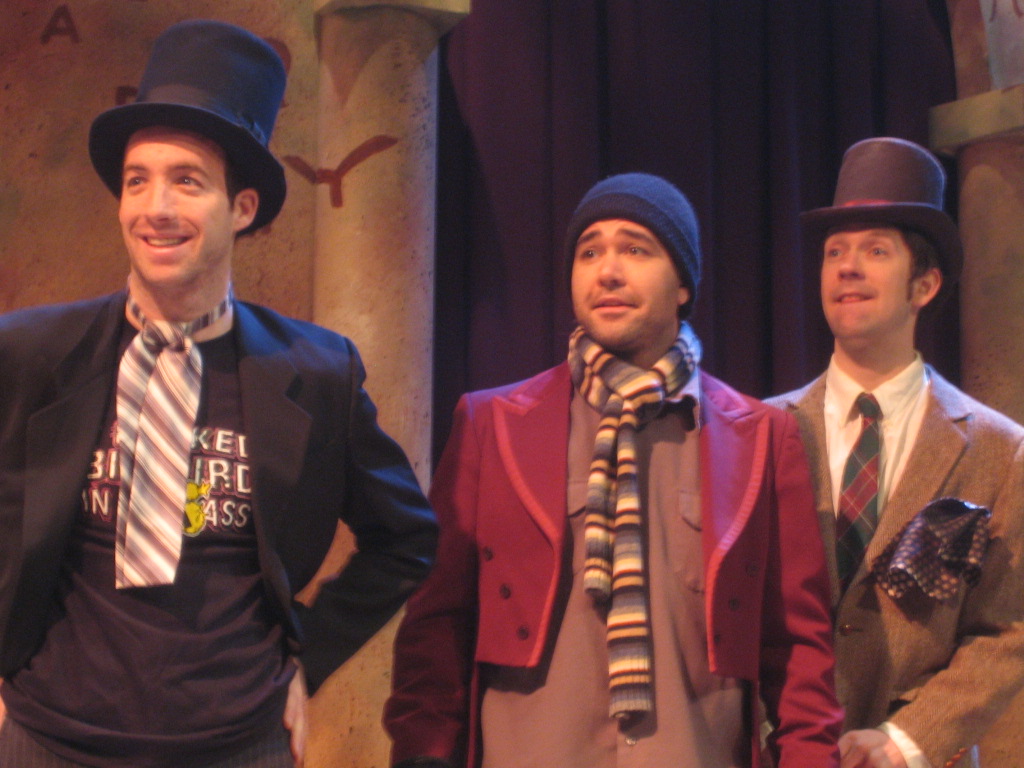As I perform and lecture and teach, one question comes up constantly: "What's your Shakespeare favorite play?"
My answer is usually something like this: "As an overall fun play to perform, nothing beats MUCH ADO ABOUT NOTHING. There are no bad parts, everyone can have a lot of fun, and the audience has a great time."
"But…" they say, hearing the hanging unsaid word.
The "but" is that favorite play is different from favorite role, which is really what they're asking. Favorite roles? Where do I start? I love playing Benedick, but I also love playing Mac. I've played him so much over the last decade he's in my bones now. It's a great part, and a great show. I used to love Mercutio, back when I was young enough. Petruchio's a blast, in a good production – I met my wife playing him. Hell, I love playing Antonio the Pirate in TWELFTH NIGHT.
On the other hand, the favorite play question is just as tricky. MUCH ADO is a true answer, but a pat one. Because on the page, and sometimes even on the stage, MUCH ADO pales when compared to TWELFTH NIGHT.
TWELFTH NIGHT is a better Comedy, because it's harder to do right. (Or perhaps it's harder to do right because it's better. Either way.)
 First, a run-down of Shakespearean Comedic devices seen in TWELFTH NIGHT:
First, a run-down of Shakespearean Comedic devices seen in TWELFTH NIGHT:
– Lovesick Man? Check.
– Smart young woman in some kind of dilemma? Check.
– Clowns? Check, check, and check.
– Disguises? Check. Specifically, woman-disguised-as-man? Double-check.
– Musicians? Checkaronni.
– Secret Wedding? Check.
– Mistiming and mistaken identity? Check and check!
– Shipwreck? Check.
– Twins? Check.
So this play has all the tropes and standard devices one thinks of in Shakespeare's Comedies. But so often they're done – well, badly.
For example – in the last couple decades at least, I've seen so many Viola's cast because they look like young men – very KD Lang. To me, that's not the joke. The joke is that, even dressed like a man, Viola is clearly a woman, and Orsino and the rest are idiots for not seeing it. In this way, realism is a hindrance. A flat-chested or taped-down Viola is less funny than one whose bosoms Orsino can't see simply because she's dressed like a man. If you have a mannish Viola, then Orsino is gay, and at the end of the play he should be in love with Sebastian, not Viola. You lose an obvious joke.
It's like the twin jokes in THE COMEDY OF ERRORS. If you cast pairs of twins that look too much alike, the audience actually has trouble keeping track of which twin is which. That undermines the comedy of mistaken identity that so much of the play hinges on. It's the characters on stage who should be confused, never the audience.
 But that's not the only reason that TWELFTH NIGHT is a harder – and better – Comedy than MUCH ADO. The jokes are both cleverer and dirtier, more urban and more urbane. There's a lot of heavy language that most Sir Toby's just blow through, not knowing what to do with it. When we did it with the Patches, we were blessed with Ben Montague in the role (pictured left during a very cold rehearsal at the Mercury Theatre in Chicago, with Scott Smith as Fabian and Andy Carey as Sir Andrew Aguecheek). Teamed with Andy, Scott, and Jan Blixt as Mariah, Ben made hilarious sense of every word. And the rap that Andy and Ben came up with on their exit one day still plays in my head. (Andy of course is part of Chicago's Improvised Shakespeare Company. Check them out!)
But that's not the only reason that TWELFTH NIGHT is a harder – and better – Comedy than MUCH ADO. The jokes are both cleverer and dirtier, more urban and more urbane. There's a lot of heavy language that most Sir Toby's just blow through, not knowing what to do with it. When we did it with the Patches, we were blessed with Ben Montague in the role (pictured left during a very cold rehearsal at the Mercury Theatre in Chicago, with Scott Smith as Fabian and Andy Carey as Sir Andrew Aguecheek). Teamed with Andy, Scott, and Jan Blixt as Mariah, Ben made hilarious sense of every word. And the rap that Andy and Ben came up with on their exit one day still plays in my head. (Andy of course is part of Chicago's Improvised Shakespeare Company. Check them out!)
Lord, now that I'm shouting out performances from that show, it's hard to forget Breon Bliss' incredible original music as Feste, or first Scott Kennedy's then Tom Taylor's Malvolio. Brendan Donaldson's baritone Valentine. And impossible to forget James Elly's show-stealing priest at the end – we had audiences returning with signs made up just for him!
Back to the show itself. There's also a boatload of clever language about people's roles in society. About love and longing. About putting on airs – everybody in that play is putting on some kind of show, from Orsino's pining to Olivia's mourning, from Viola's disguise to Malvolio's ambitious yellow-stockings. Nobody is what they want others to think they are. And therein lies the fertile land of Comedy.
It's a hard show to do, but if it's done well, it's my favorite Shakespeare play.
Except for…
To be continued.

